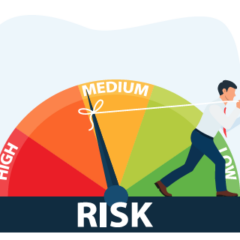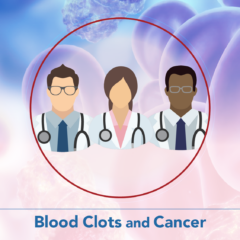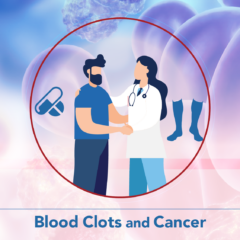Published on
Treatment of Cancer-Associated Blood Clots
Special Series: Approaches to Patients with Cancer and Thrombosis (Blood Clots)
Plain language summary of Treatment of Cancer-Associated Venous Thromboembolism with Low-Molecular-Weight Heparin or Direct Oral Anticoagulants: Patient Selection, Controversies, and Caveats (The Oncologist, January 2021)
This article talks about how to choose between available treatments for blood clots in patients with cancer. Here are some of the key findings.
- Cancer increases your risk of blood clots. Blood-thinning medicines help prevent blood clots but also increase your risk of bleeding and other health problems.
- Two kinds of blood-thinning medicines called anticoagulants help prevent and treat blood clots:
- Low-Molecular-Weight Heparin (LMWH)
- Direct Oral AntiCoagulants (DOACs)
- New research recommends DOACs for the treatment of blood clots in most (but not all) cancer patients. LMWH is still recommended for patients with stomach cancers and other health problems.
- DOAC medicines are pills you swallow. LMWH medicines are given by injection. Cancer patients who have blood clots should take blood thinning medicine for at least 6 months or until cancer treatment ends.
- Your doctor will consider what type of cancer you have, your risk of bleeding, other health problems, in addition to how you prefer to take the medicine (pill or injection) and for how long, when choosing between LMWH or DOACs to treat blood clots.
Factors to consider and questions to ask your doctor when deciding between LMWH or DOAC to treat or prevent blood clots
| Cancer Factors | – Does my type of cancer affect which blood clot treatment I can have? – Does the chemotherapy drug I am taking affect the blood clot treatment I can have? – Does my cancer treatment include surgery and how does that affect the blood clot treatment I can have? |
| Patient Factors | – What other health problem do I have and how does that affect the blood clot treatment I can have? – Does my age affect which blood clot treatment I can have? – Can I swallow pills and take them as prescribed for 6 month or more? – What is the cost of treatment and will my insurance cover it? |
DOAC Recommendations
DOACs recommended for MOST cancer patients, including patients
- At home who DO NOT have stomach cancer and who CAN swallow pills
- In the hospital who DO NOT have surgery planned
DOACs NOT recommended for cancer patient at home or in the hospital with
- Poor kidney function
- Stomach or intestinal cancers
- Bladder or urinary tract cancers
- Stomach ulcers
- Some cancer treatments
- drugs that affect P-glycoprotein, CYP3AR or CYP21
- Liver problems
- Surgery planned
LMWH Recommendations
LMWH recommended for some patients, including patients
- At home who DO have stomach cancers or who CANNOT swallow pills
- In the hospital who DO have surgery planned
LMWH recommended for cancer patient at home or in the hospital with
- Poor kidney function
- Stomach or intestinal cancers
- Bladder or urinary tract cancers
- Stomach ulcers
- Some cancer treatments
- drugs that affect P-glycoprotein, CYP3AR or CYP21
- drugs that interact with DOACs
- Very low platelet levels in the blood (high risk of bleeding)
- Liver problems
- Surgery planned



